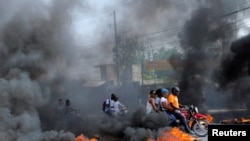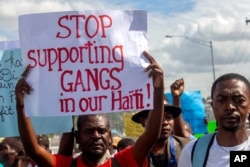The United Nations has allocated $5 million from its Central Emergency Response Fund, or CERF, to address Haiti’s growing destitution caused by gang violence.
U.N. aid agencies say that since July, nearly 500 people have been killed in clashes between gangs in Haiti’s Cite Soleil, an extremely poor and densely populated area in the capital, Port au Prince.
The U.N.’s Office for the Coordination of Humanitarian Affairs estimates nearly 280,000 people are trapped by the fighting. The agency warns conditions are worsening as growing violence is keeping people from food, drinking water and health care.
OCHA spokesman Jens Laerke says the money released by CERF will help underfunded humanitarian agencies respond to Haitians’ immediate needs. He acknowledges that $5 million is a small amount but says it is a critical amount of money right now.
“Funding through UNICEF and WFP, our colleagues will provide food, drinking water, health care, mental health and education support to more than 100,000 people in total…What often happens when we inject money from the CERF is that other donors follow because it comes, of course, with a message and a signal that this is critical lifesaving interventions we need now,” said Laerke.
UNICEF says about 20% of Cite Soleil children under age 5 suffer from severe or moderate acute malnutrition. It says thousands are at risk of dying because gang violence prevents them from receiving adequate health and nutrition care.
The World Food Program says nearly half of Haiti’s population, some 4.4 million people are going hungry. Laerke says providing aid to the many people in need is a challenge.
“The high level of insecurity in Haiti is compromising humanitarians’ access to affected people. For example, for food and cash distributions, but also to basic services, such as health and education, for between 1 and 1.5 million people trapped in gang-controlled neighborhoods in the Port-au-Prince metropolitan area," Laerke said.
OCHA warns the outlook for an estimated 4.9 million Haitians in need of humanitarian assistance is not promising. It notes the United Nations has received just 14% of the $373 million it needs for its lifesaving operations this year.





